Charleston Currents #12.08 | Dec. 23, 2019
TWINKLE TWINKLE: There are a few days left to experience the grandeur of the Holiday Festival of Lights at James Island County Park. The annual attraction is open through the last day of the year. Photo provided.
 TODAY’S FOCUS, Plastic straws, bags, clamshells, more to go away in Charleston
TODAY’S FOCUS, Plastic straws, bags, clamshells, more to go away in Charleston
COMMENTARY, Brack: Impeachment having impact in S.C. politics
IN THE SPOTLIGHT: Morris Financial Concepts, Inc.
GOOD NEWS: Port grows, Green’s mural, holiday safety, more
FEEDBACK: Think of the good
MYSTERY PHOTO: Different perspective
S.C. ENCYCLOPEDIA: Furman University, founded 169 years ago
CALENDAR: Free parking available in downtown Charleston garages
Charleston Currents will take a holiday break next week. Our next issue will be Jan. 6, 2020. Have a happy holiday season — and be safe on the highways and byways of South Carolina.
Plastic straws, bags, clamshells, more to go away in Charleston
Staff reports | New single-use plastic regulations that eliminate the use of single-use plastic carryout and merchandise bags, as well as some plastic carryout and food packaging items, start Jan. 1 in the city of Charleston.
The new requirements were enacted to maintain cleaner streets and waterways and preserve the beauty and livability of the Charleston area for generations to come, the city of Charleston said.
Among the items that no longer will be allowed are:
- Polystyrene (also known as plastic foam or StyrofoamTM) and other non-recyclable and non-compostable food service ware, carryout containers and food packaging materials such as bowls, boxes, clamshells, cups, plates, stirrers and straws.
- The selling or renting of polystyrene bowls, cups, plates, coolers, containers, ice chests, shipping boxes and packing material.
According to a press release, the new guidelines apply to all commercial and nonprofit operations including: concession/event vendors and food trucks, farmers markets/stands and takeout stands, schools and government, grocery and liquor stores, restaurants and bars and retail stores.
Establishments will be able to choose from affordable alternatives and certain specialty items will still be allowed such as reusable bags and recyclable paper bags, recyclable or compostable disposable food containers and service ware including: aluminum, cardboard, glass, paper and recyclable plastics.
The following specialty items are not restricted: bags for bulk grocery items, bags for raw, frozen or prepared foods, bread bags, condiment packages, cutlery, deli bags, dry cleaning/garment bags, egg cartons, floral/plant wrapping, garbage bags, meat trays, newspaper bags, pet waste bags, plastic drink or soup container lids, produce bags and straws for use by customers with disabilities.
- More information is available online at www.charleston-sc.gov/plastic.
- Have a comment? Send to: editor@charlestoncurrents.com
Impeachment having impact in S.C. politics
By Andy Brack, editor and publisher | The harsh crescendo of Washington bullheadedness seems to be trickling down into politics across South Carolina.
 The impeachment of President Donald Trump may be exacerbating divides in the electorate while also motivating partisans to do more in new ways. Others say the whole thing is a nothingburger.
The impeachment of President Donald Trump may be exacerbating divides in the electorate while also motivating partisans to do more in new ways. Others say the whole thing is a nothingburger.
Regardless, be ready for more tribalism — talking, planning, postulating and politicking among people with the same general worldview — and less listening to people with different viewpoints. Some elected officials, emboldened by Trump’s never-back-down coarseness — may have a harder time getting things done in the Palmetto State because their rhetoric will narrow opportunities for compromise.
But impeachment may bring another impact. While people inclined to stay out of political conversations have calcified in their views, Charleston activist Charlie Smith observes “the shock of what it has done to the rest of us has caused us to get off our butts and do something.”
The swirl of negativity out of Washington has been a pill of anti-complacency. Impeachment, Smith said, seems to be motivating people to show up more at local political events by “pulling people out who are speaking out more on issues who have never spoken before.”
S.C. Sen. Brad Hutto, D-Orangeburg, said he didn’t believe Trump’s impeachment would have much of an immediate impact among voters because it may not change many people’s minds. But just as the 2018 congressional elections ended up being a referendum on Trump that flipped the U.S. House to Democratic control, the impeachment could have a slow burn effect for the 2020 election.
“Trump himself is a lightning rod and should increase voter turnout in the 2020 general election and Democratic presidential primary” in February, Hutto said.
Impeachment seems to have hardened views of colleague Paul Campbell, a GOP senator from Berkeley County.
“President Trump’s impeachment is stupid as there are no laws broken, no high crimes or anything impeachable.” he said. “We have wasted so much time on what could have been legislation for the peoples’ good.”
In general, red South Carolina is ignoring the shenanigans going on in Washington and is moving forward, he said.
“The improved economy in South Carolina is a credit to President Trump. The low unemployment rate is his doing with the tax cuts, job creation, getting folks off welfare and food stamps, reducing red tape on regulations, and in general improving our USA. This and impeachment will have a positive impact on the 2020 election for Republicans.”
Longtime Republican consultant Chip Felkel of Greenville isn’t so sure. Long frustrated by Trump’s volatility and lack of smart governance, Felkel has been a voice for conservatives to moderate shrill voices and work together to solve problems.
“Let’s face it, like the rest of the country, we see a lot of tribalism and hyper-partisanship here already. The process hasn’t moved people’s opinions too much. It was anticipated he would be impeached and it’s anticipated he won’t be convicted.
“It would only really affect us here if he were to be convicted — which right now seems unlikely – and if so, only in terms of the ties to the White House by Gov. Henry McMaster and U.S. Sen. Lindsey Graham.”
Still, Trump’s presidency is making politics everywhere more difficult.
“It’s fair to say this presidency has affected politics everywhere in terms of what was once unheard of, now being common,” Felkel said. “Our politics, here and elsewhere, are much coarser, harsher and hard-edged.
“His style, which many disregard as just Trump being Trump, has certainly contributed to the toxicity. A lot of people want to ignore, forgive or just accept Trump’s ‘Archie Bunker’ style by looking at the economy or what they see as him standing up to other countries.
“That works fine as a CEO of your own company, but I am not sure it’s the best recipe for being the leader of the free world.”
As state lawmakers return to Columbia, let’s hope they take a flask of holiday goodwill and keep it in their pockets. Pull it out when things get testy at the Statehouse in the months ahead. Remember, you work for us and we want progress, not regress.
- Andy Brack is the editor and publisher of Charleston Currents and Statehouse Report. Have a comment? Send to: editor@charlestoncurrents.com
Morris Financial Concepts, Inc..
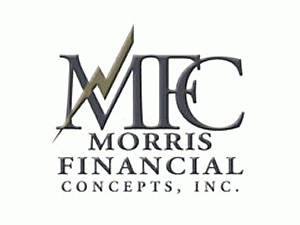 The public spiritedness of our sponsors allows us to bring Charleston Currents to you at no cost to readers. Morris Financial Concepts, Inc., is a nationally recognized, fee-only financial consulting firm that helps you identify and align your resources, values and goals to achieve an enriched life.
The public spiritedness of our sponsors allows us to bring Charleston Currents to you at no cost to readers. Morris Financial Concepts, Inc., is a nationally recognized, fee-only financial consulting firm that helps you identify and align your resources, values and goals to achieve an enriched life.
We do not accept commissions or compensation related to the products and service we recommend. Our counsel is based solely on what we believe is best for each client.
- Learn about founder and Charleston Currents columnist Kyra Morris and more about the consultancy at: Morris Financial Concepts, Inc.
Port grows, Green’s mural, holiday safety, more
Ports positioned well for 2020. The S.C. Ports Authority says it is a good position for continued growth after a 2019 that has already seen handling of nearly 2.25 million twenty-foot equivalent container units (TEUs) since January. “Looking ahead to 2020, we expect to continue weathering uncertainty in the world economy, but our strong position in the Southeast and proximity to a booming consumer market will drive growth,” SCPA President and CEO Jim Newsome said in a press release. “We expect to grow above the market as more cargo shifts from West Coast to East Coast ports.” Recently, the Journal of Commerce ranked the Port of Charleston and Wando Welch Terminal first in North America among mid-sized for productivity, the release said.
![]() Green mural unveiled at S.C. federal courthouse. U.S. District Judge Richard Gergel on WHEN unveiled Jonathan Green’s mural “Breath of Freedom.” It depicts a moment during the renowned Briggs v. Elliott school case that was heard in downtown Charleston 1951 and influenced the landmark federal ruling in Brown v. Board of Education that desegregated public schools nationwide. Read more.
Green mural unveiled at S.C. federal courthouse. U.S. District Judge Richard Gergel on WHEN unveiled Jonathan Green’s mural “Breath of Freedom.” It depicts a moment during the renowned Briggs v. Elliott school case that was heard in downtown Charleston 1951 and influenced the landmark federal ruling in Brown v. Board of Education that desegregated public schools nationwide. Read more.
Dubious honor: Charleston has worst plastic pellet pollution on East Coast. A University of Texas Marine Science Institute at Port Aransas researcher has found that Charleston has the highest measured concentration of spilled plastic pellets anywhere outside of the Gulf of Mexico. Read more.
- Previous coverage: State encourages more plastic-pellets transporters despite spill.
Real honor: Portrait of Bowman’s Matthews unveiled. A portrait of longtime Bowman Democratic Sen. John Matthews now hangs in the Statehouse in honor of his service. Matthews is the state’s longest serving black legislator. Read more.
Rally to end gerrymandering Jan. 14. A rally to end gerrymandering will greet lawmakers when they reconvene in Columbia Jan. 14. According to Fair Maps SC Coalition, only 10 percent of the General Assembly’s 170 seats are competitive. More info.
Be safe on the holiday highways. About a third of all fatal car wrecks in South Carolina are related to drunk driving, according to federal data. The state has the fifth worst drunk driving rate in the nation. Read more.
- Have a comment? Send to: editor@charlestoncurrents.com
Think of the good
To the editor:
![]() I received a check for $1.01 refund from Dominion Energy. That is of little good to me but if all of the refunds were lumped together, even the $1.00 ones, think what it could do if given to the schools.
I received a check for $1.01 refund from Dominion Energy. That is of little good to me but if all of the refunds were lumped together, even the $1.00 ones, think what it could do if given to the schools.
Teachers and children could really benefit from it.
–– Irene Smith, Charleston, S.C.
On target with legislative priorities
To the editor:
This is a great list of legislative priorities.
— Carol Tempel, James Island S.C.
Got something to say? Let us know by mail or email
We’d love to get your impact in one or more ways:
Send us a letter: We love hearing from readers. Comments are limited to 250 words or less. Please include your name and contact information. Send your letters to: editor@charlestoncurrents.com. | Read our feedback policy.
Tell us what you love about the Lowcountry. Send a short comment – 100 words to 150 words – that describes something you really enjoy about the Lowcountry. It can be big or small. It can be a place, a thing or something you see. It might the bakery where you get a morning croissant or a business or government entity doing a good job. We’ll highlight your entry in a coming issue of Charleston Currents. We look forward to hearing from you.
Different perspective
The picture above is in Charleston, but where? It’s an odd perspective. Perhaps the painting offers a clue. Send your guess to: editor@charlestoncurrents.com. And don’t forget to include your name and the town in which you live.
Our previous Mystery Photo
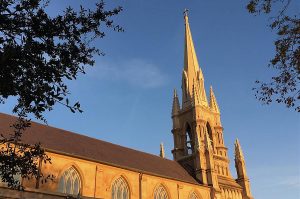 Our Dec. 16 mystery, “Warm, afternoon light,” showed the glow of Grace Church Cathedral on Wentworth Street in the waning light of a recent chilly Charleston day.
Our Dec. 16 mystery, “Warm, afternoon light,” showed the glow of Grace Church Cathedral on Wentworth Street in the waning light of a recent chilly Charleston day.
Holiday congratulations to these sleuths who identified the photo: Marnie Huger of Richmond, Va.; George Graf of Palmyra, Va.; Stephen Yetman and Legare Clement, both of Charleston; Jay Altman of Columbia; Katrina Wheeler of West Ashley; and Charlie Morrison of James island.
- Send us a mystery: If you have a photo that you believe will stump readers, send it along (but make sure to tell us what it is because it may stump us too!) Send it along to editor@charlestoncurrents.com.
Furman University, founded 169 years ago this month
S.C. Encyclopedia | On December 3, 1825, the South Carolina Baptist Convention (SCBC) elected a board to organize an institution to train young men for the ministry. The Furman Academy and Theological Institution was established the following year. It officially opened in January 1827 and was named in honor of Richard Furman, a Baptist minister and education pioneer.
Originally located in Edgefield, Furman provided both a “literary” and a theological curriculum. Few students enrolled, however, and the school teetered on insolvency during its first twenty-five years. Furman was closed for a brief period (1834–1837), moved twice (to the High Hills of Santee near Stateburg, 1829–1834; to Fairfield District near Winnsboro, 1837–1850), and had an average enrollment of only ten students.
On December 20, 1850, the state legislature chartered “The Furman University.” Classes were held in downtown Greenville until the first building, a two-room wooden cottage, could be erected on a new fifty-acre campus overlooking the Reedy River. The institution was composed of an academic department that offered college-preparatory studies (discontinued in 1916), a collegiate department comprised of six “schools,” and a theological department—with graduate studies—that provided justification for Furman’s designation as a university. The theological department operated until 1859, when it separated to become the Southern Baptist Theological Seminary, which moved to Louisville, Kentucky, in 1877.
Like most southern institutions, Furman was disrupted by the Civil War. President James C. Furman was a member of the Charleston Secession Convention, and after the Civil War began, most students and several faculty members enlisted in the Confederate forces. The university closed in the fall of 1861 and did not reopen until the winter of 1866, although at the time there was no money even to print a catalog.
Financial problems continued to haunt the school, and near bankruptcy prompted reorganization in 1881. At the turn of the century, Greenville’s textile prosperity, along with effective and academically rigorous presidents, brought a surge of northern philanthropy to the school. In December 1924 Furman was accredited by the Southern Association of Colleges. Five days later the president learned that the university had been named one of the collegiate beneficiaries of the Duke Endowment. A watershed in the university’s history, this bequest kept Furman alive during the Great Depression. In 1936, with Furman still $170,000 in debt, school officials sought additional funding from the General Education Board of the Rockefeller Foundation to sponsor the Greenville County Council for Community Development. Among other activities, this organization coordinated participation of Furman faculty and students in novel university-community undertakings, including a Citizens Education Center and several teacher-training institutes.
Furman’s growth was paralleled by that of the Greenville Woman’s College. Initially called the Greenville Baptist Female College, the Woman’s College was established in 1854 by the SCBC and governed by Furman’s trustees until 1908. The school had high aspirations and inspired teaching but had no endowment. The Woman’s College and Furman undertook joint fund-raising campaigns, and their students participated in shared activities. While its extensive music and education programs helped make it the second-largest women’s college in the state (Winthrop University was larger), it could not survive the economic chaos of the 1930s, when it gradually became the coordinate women’s college of Furman.
In 1950, with highway projects threatening to divide Furman’s property and with enrollment at record levels, the university’s trustees purchased approximately nine hundred acres for a new campus six miles north of downtown Greenville. Groundbreaking took place in 1953, men moved to the new campus in 1958, and women joined them in 1961. At the urging of Dean Frances Bonner, incoming president Gordon Blackwell, and the rest of the university community, the board of trustees affirmed its support of integration in December 1964, despite protests from the state Baptist Convention. The school was officially integrated a couple of months later. In 1973, after trying to attain one for more than three decades, Furman was awarded a Phi Beta Kappa chapter.
Throughout the twentieth century Furman maintained a balance between intellectual rigor and denominational priorities. This became increasingly difficult in the 1980s with the rise of conservative evangelicals within the SCBC. For that reason, Furman’s trustees voted to sever all ties with the SCBC on October 15, 1990; the SCBC officially recognized that break on May 15, 1992. The potential financial consequences of this decision were significant for Furman, but the institution’s liberal-arts focus remained unchanged.
Notable Furman graduates include John B. Watson, one of the founders of behavioral psychology; Charles Hard Townes, a Nobel laureate in physics; and Richard Riley, a governor of South Carolina and U.S. secretary of education.
— Excerpted from an entry by A Scott Henderson This entry may not have been updated since 2006. To read more about this or 2,000 other entries about South Carolina, check out The South Carolina Encyclopedia, published in 2006 by USC Press. (Information used by permission.)
Free parking still available in downtown Charleston garages
Staff reports | Charleston city and county governments have partnered to offer two-hour parking vouchers valid at select garages, now through Wed. Jan. 1. The voucher can be used at these garages:
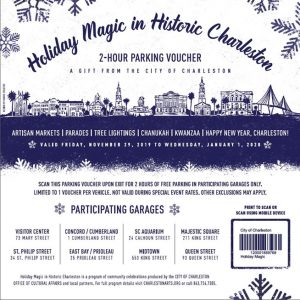 Visitor Center, 73 Mary St.
Visitor Center, 73 Mary St.- Concord/Cumberland, 1 Cumberland St.
- S.C. Aquarium, 24 Calhoun St.
- Majestic Square, 211 King St.
- St. Philip St., 34 St. Philip St.
- East Bay/Prioleau, 25 Prioleau St.
- Midtown, 553 King St.
- Queen Street, 93 Queen St.
Also on the calendar:
Holiday Festival of Lights: Opens 5:30 p.m., through Dec. 31, 2019, James Island County Park. Now in its 30th year, the Holiday Festival of Lights is open every evening, rain or shine, with closing set for 10 p.m., except Fridays and Saturdays, which close at 11 p.m. The show returns to make merry magical memories with its vibrant light show is one of Charleston’s most cherished holiday events, featuring an estimated two million dazzling lights. More.
Ahead at Gaillard Center: Enjoy something a little different (perhaps) in January at the Charleston Gaillard Center on Calhoun Street:
![]() Bach’s Brandenburg: 7:30 p.m. Jan. 10 and 11. The Charleston Symphony Orchestra will present an evening of groundbreaking and brilliant—but certainly not overwrought—baroque classics, featuring two of Bach’s six Brandenburg Concertos. Tickets are $25 to $114.
Bach’s Brandenburg: 7:30 p.m. Jan. 10 and 11. The Charleston Symphony Orchestra will present an evening of groundbreaking and brilliant—but certainly not overwrought—baroque classics, featuring two of Bach’s six Brandenburg Concertos. Tickets are $25 to $114.
Royal Philharmonic Orchestra: 7:30 p.m., Jan. 14. Led by conductor Mark Wigglesworth and featuring pianist Olga Kern, RPO will perform Dove Sunshine, Rachmaninov Piano Concerto No.2, and Sibelius Symphony No.2. Tickets are $25 to $119.
From Russians With Love: 7:30 p.m., Jan. 23. The Charleston Symphony Orchestra will offer an evening of Russian symphonic and popular music, including Flight of the Bumblebee, Firebird, Night on Bald Mountain, and of course, From Russia with Love. Tickets are $25 to $114.
Black America: Resilient: Through Jan. 25, 2020, Redux Contemporary Art Center, 1056 King St., Charleston. The center offers this solo show that highlights the work of Dontré Major, a College of Charleston art graduate whose work takes a look at Black/African Americans in the United States during different periods throughout time. Each photograph is meant to emulate the feelings individuals had during these specific times, and touch on the struggle they went through to be seen as equals.
North Charleston art shows: Open daily through Jan. 31, North Charleston City Gallery, Charleston Area Convention Center, 5001 Coliseum Drive, North Charleston. On display are paintings by Pinopolis artist Katherine Hester in an exhibit titled Ebb and Flow and photographs by North Charleston photographer Jenion Tyson in A Bug’s Eye View: Macro Photograph in the Garden. Admission is free.
Lights of Magnolia: 5:30 p.m. to 9:30 p.m., through March 15, 2020, Magnolia Plantation and Gardens, West Ashley. Enjoy nine acres of Chinese lanterns, dragons and more at the venerable garden’s new evening attraction. The lantern festival includes custom-designed installations of large-scale thematically unified lanterns, a fusion of historic Chinese cultural symbols and images that represent the flora and fauna of Magnolia. Learn more online. Tickets are $11-$26. On-site parking is limited, but shuttles are available. For more information and frequently asked questions, click here.
Early morning bird walks at Caw Caw: 8:30 a.m. every Wednesday and Saturday, Caw Caw Interpretive Center, Ravenel. You can learn about habitats and birds, butterflies and other organisms in this two-hour session. Registration is not required, but participants are to be 15 and up. $10 per person or free to Gold Pass holders. More: http://www.CharlestonCountyParks.com.
AREA MARKETS
- FRIDAYS/SATURDAYS: Night Market. Every Friday and Saturday from 6:30 p.m. to 10:30 p.m. for the rest of the year, you can shop with 108 vendors, including artists and craftsmen, at the night market on Market Street between East Bay and Church streets. It’s more than four blocks of local shopping and fun. Free.
- SATURDAYS: Johns Island Farmers Market operates each Saturday from 9:30 a.m. to 1:30 p.m. year-round with more than 50 local farmers and vendors, food trucks, music and more. The market is located on the campus of Charleston Collegiate School, 2024 Academy Road, Johns Island
- If you have an event to list on our calendar, please send it to feedback@charlestoncurrents.com for consideration. The calendar is updated weekly on Mondays.
 If you like what you’ve been reading, how about considering a contribution so that we can continue to provide you with good news about Charleston and the Lowcountry. Interested? Just click the image below.
If you like what you’ve been reading, how about considering a contribution so that we can continue to provide you with good news about Charleston and the Lowcountry. Interested? Just click the image below.
OUR UNDERWRITERS
Charleston Currents is an underwriter-supported weekly online journal of good news about the Charleston area and Lowcountry of South Carolina.
- Meet our underwriters
- To learn more about how your organization or business can benefit, click here to contact us. Or give us a holler on the phone at: 843.670.3996.
OUR TEAM
Charleston Currents offers insightful community comment and good news on events each week. It cuts through the information clutter to offer the best of what’s happening locally.
- Mailing address: 1316 Rutledge Avenue | Charleston, SC 29403
- Phone: 843.670.3996
Charleston Currents is provided to you weekly by:
- Editor and publisher: Andy Brack, 843.670.3996
- Contributing editor, common good, Fred Palm
- Contributing editor, money: Kyra Morris
- Contributing editor, Palmetto Poem: Marjory Wentworth
- Contributing editor, real estate: Digit Matheny
- Contributing photographer: Rob Byko
SUBSCRIBE FOR FREE
Subscriptions to Charleston Currents are free.
- Click here to subscribe.
- Unsubscribe. We don’t want to lose you as a reader of Charleston Currents, but if you must unsubscribe, you will have to do it through the email edition you receive. Just go to the bottom of any of your weekly newsletters and click the “unsubscribe” function. If that doesn’t work, please send us an email with the word “unsubscribe” in the subject line.
- © 2008-2019, City Paper Publishing, LLC. All rights reserved. Charleston Currents is published every Monday by City Paper Publishing LLC, 1316 Rutledge Ave., Charleston, SC 29403.


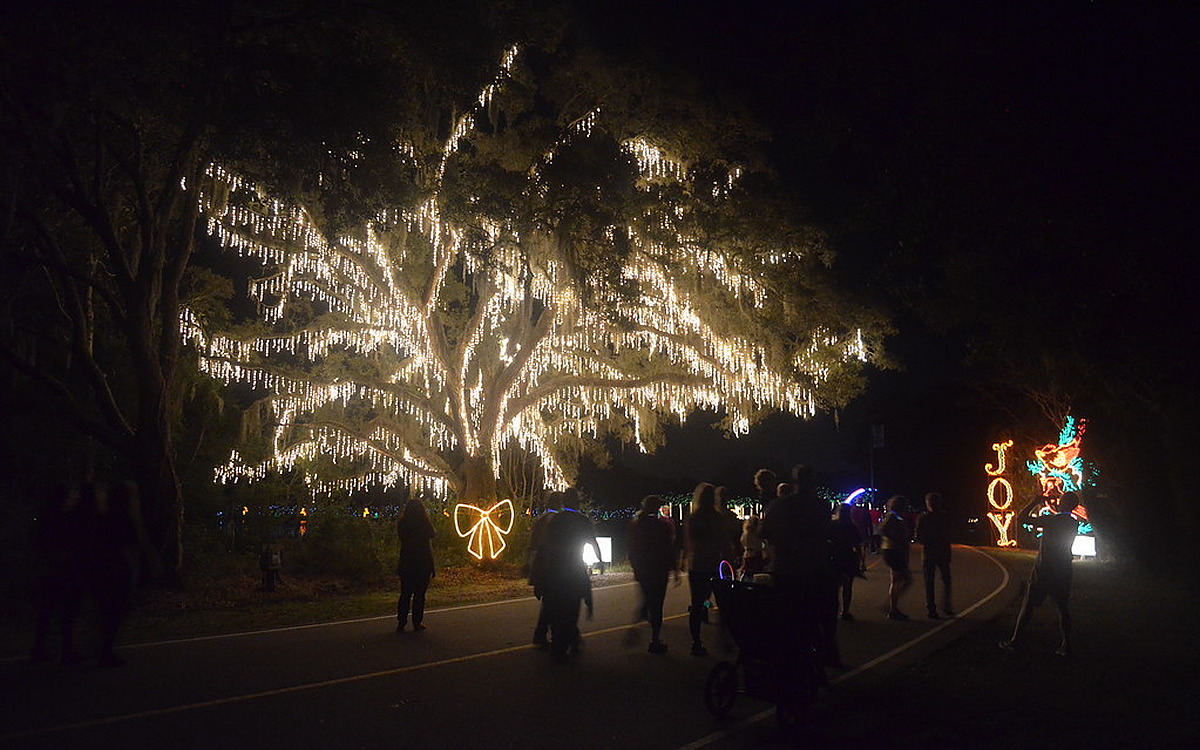

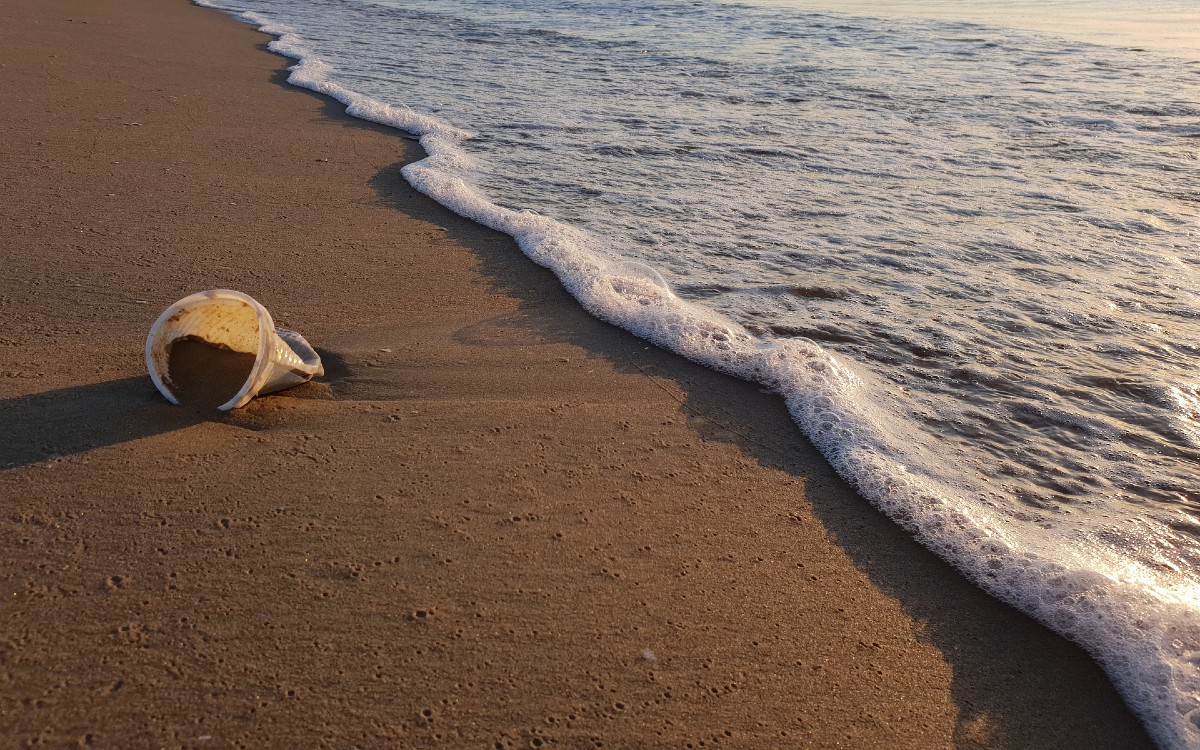
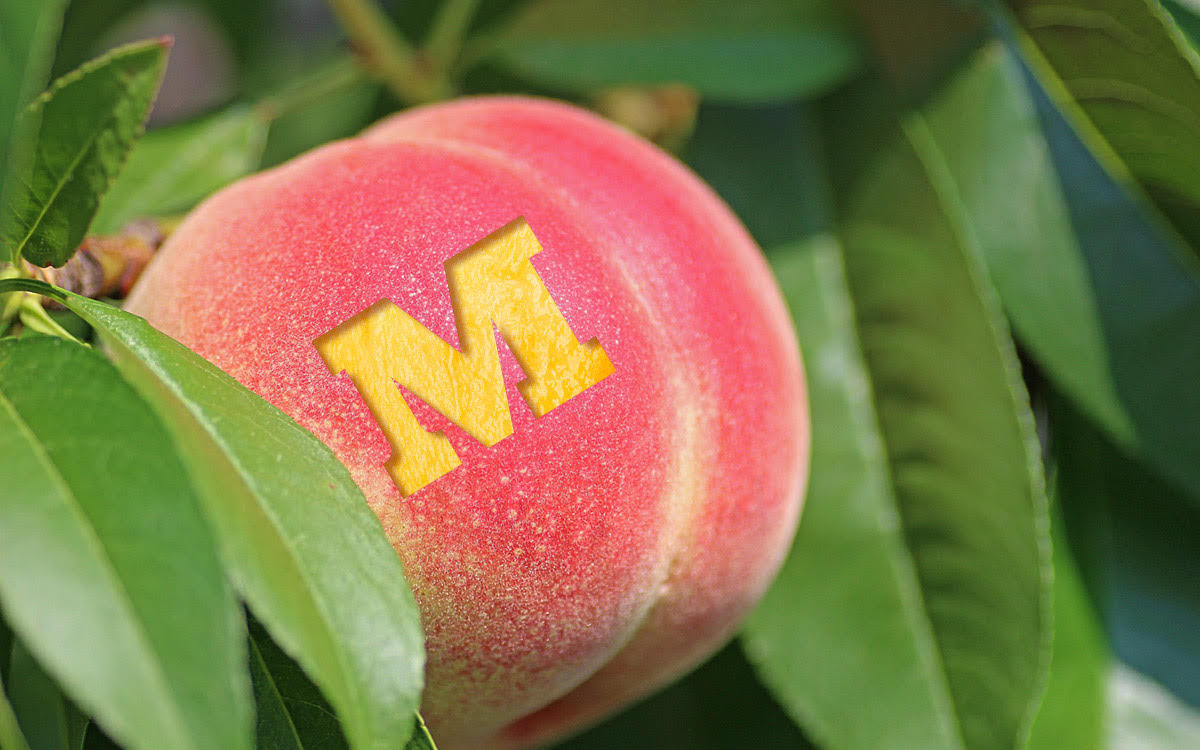
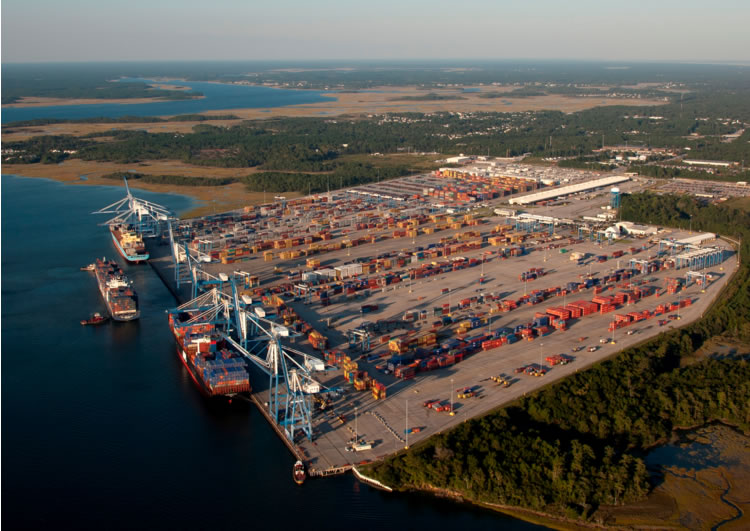
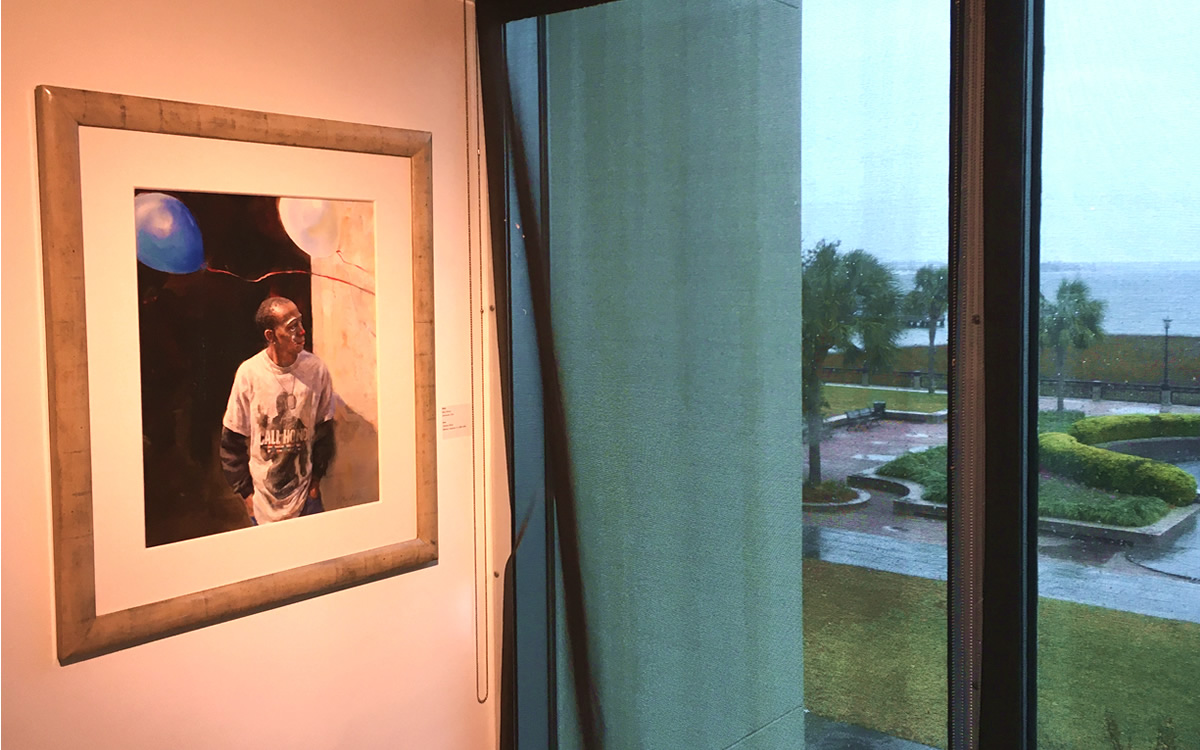
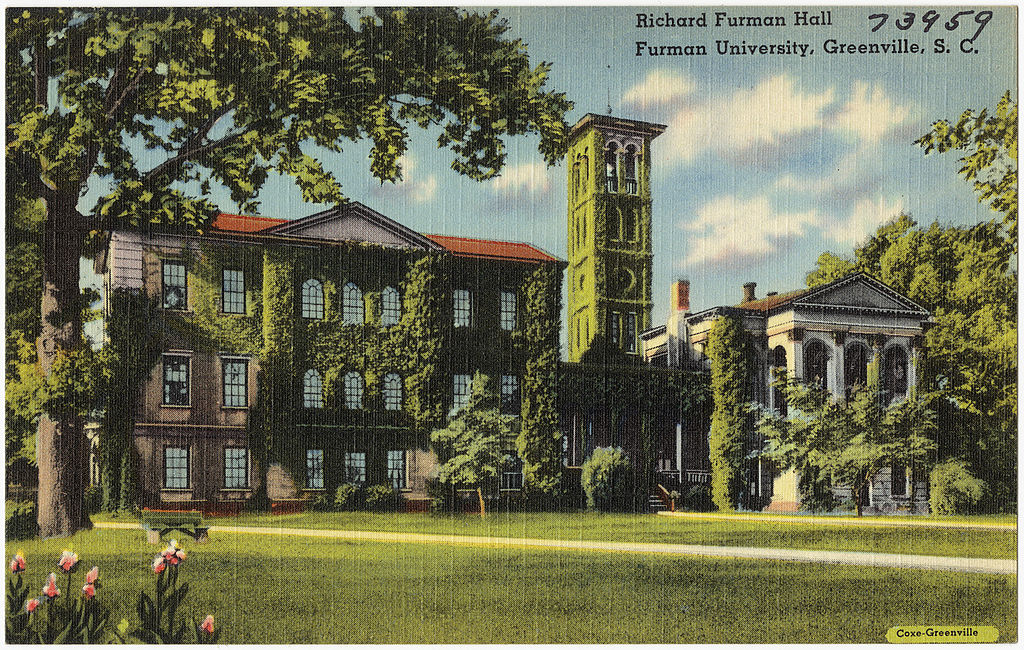

 We Can Do Better, South Carolina!
We Can Do Better, South Carolina!
























